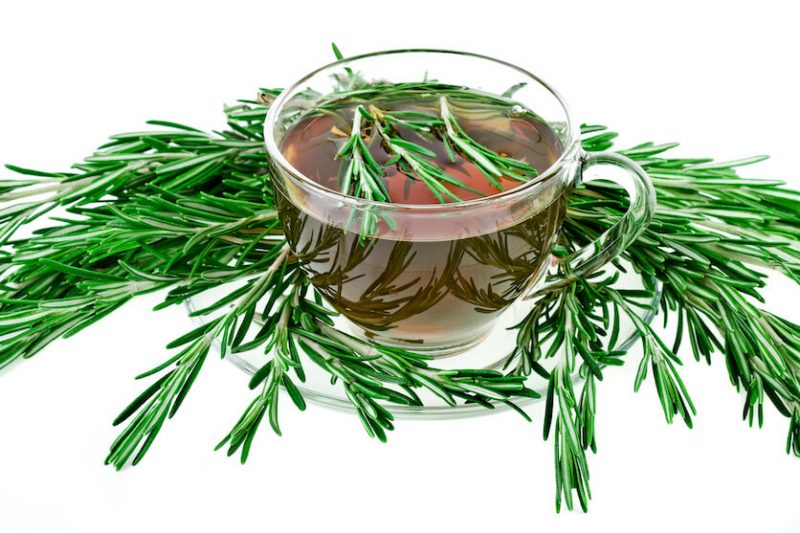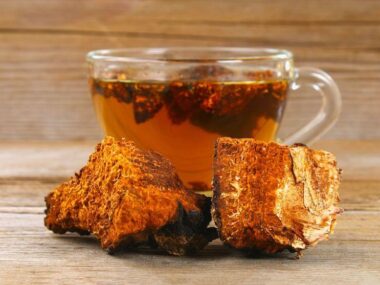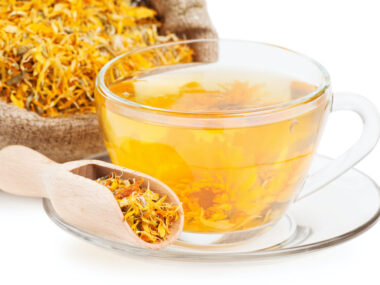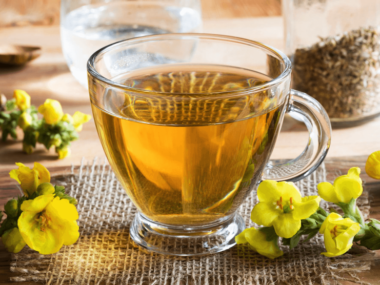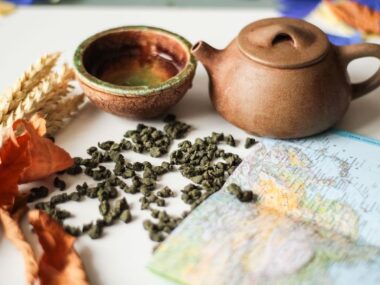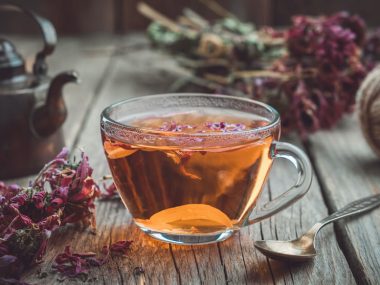Most of us have not had the opportunity of trying a cup of rosemary tea. In our mind, this pointy-needle herb belongs in soups or bread. Why on earth would someone make tea out of it? Let’s decode together!
Table of Contents
What Is Rosemary Tea?
Rosemary tea is a tisane (herbal tea) made from Rosemary officinalis. Traditional medicine, Ayurvedic, Chinese, Unani, herbalists, and other unconventional medicines use this tea to treat various ailments. The medicinal use of rosemary dates back to ancient times.
What Is Rosemary?
Rosemary belongs to the mint family that includes other aromatic herbs such as lavender, basil, sage, mint, and thyme. It is native to the Mediterranean region, where you’ll find it growing wild. It’s considered to be a common plant in this area. Those of us who painstakingly try our hand at cultivating one of these plants in our garden envy those who have accessible wild rosemary in the Mediterranean.
When first looking at a rosemary plant, it resembles a sparse piney-looking shrub. The leaves are needle-like and coarse. Tiny little purple flowers bloom on the plant, and when looking at one up close, the little flower almost resembles a cross between an orchid and iris.
Rosemary is best known for its widespread culinary use around the world. Everything from meat dishes to desserts is flavored with this herb. Gardeners plant rosemary to have access to this fresh herb for cooking or making teas. Some even grow it because they delight in its aroma. The slightest brush against the needle-like foliage of rosemary releases its strong, pungent, piney smell.
History and Background Of Rosemary
The historical use and cultural significance of rosemary may not have fossil records to back them up, but it is known that this herb goes a long way back.
This herb’s original name, “Rose Mary,” was to honor the Virgin Mary. The Latin translation of “Rosmarinus” (genus of Rosemary) is “dew of the sea.” There are many legendary beliefs that highlight rosemary. In Spain, it’s believed that a rosemary bush hid Virgin Mary at some point when she was fleeing to Egypt. There is a legend that rosemary’s lifespan is limited to 33 years and that it never grows taller than Jesus at the time of his crucifixion.
Ancient Greeks believed that the burning of rosemary would ward off evil and sickness. Different cultures in Europe believed rosemary to be a sign of love and fidelity. It’s not uncommon for bridegrooms and brides to have a twig of rosemary on their person for the wedding ceremony.
This herb has managed to find its way into foods and beverages we’ve come to know and love today. Our palate is quick to pick up the flavor of rosemary because of its intense flavor and aroma.
What Does Rosemary Tea Taste Like?
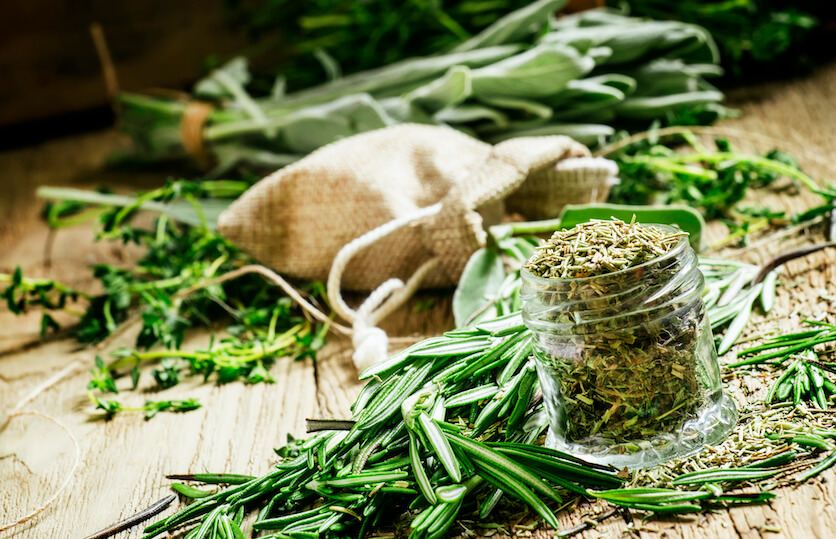
If you were to bite into fresh rosemary, you’d be met with a rather unpleasant taste. It will be bitter with intense camphor, piney flavor. When making a tea with rosemary, those flavors are infused into the water, making it a more palatable aromatic version minus the harsh bitterness.
Does Rosemary Tea Have Caffeine?
A traditional rosemary tea is unadulterated (no other additives.) This tea is a tisane (herbal tea) and does not contain a true tea such as black, green, oolong, yellow or white. Tisanes are caffeine-free, and unless it is blended with one of the “true teas,” it will not contain caffeine.
There are rosemary-black tea blends on the market. This odd combination is not something we would expect because of the pungent intensity that rosemary has. Likewise, there are homemade tea blends that include green tea and rosemary. Whether it’s a cup of black or green tea with rosemary, these may have up to 70 mg of caffeine because of the black/green tea.
Does Rosemary Make You Sleepy?
There are numerous claims by herbal tea retailers that rosemary tea helps sleep. However, the only evidence-based data connecting rosemary and a sedating effect come from research studies done with wistar rats. One study (Rosmarinus officinalis L. (rosemary) as therapeutic and prophylactic agent) reported that rats were given higher concentrations of rosemary (400 g/kg) which produced an anxiolytic (stress-reducing, less anxious) effect that is similar to that of diazepam.
The only rosemary clinical trial with humans was that of “The Effect of Inhaling the Aroma of Rosemary Essential Oil on the Pre-Hospital Emergency Personnel Stress and Anxiety: A Quasi-Experimental Study.” Rosemary essential oil was used as aromatherapy for emergency room personnel to reduce stress. The results concluded that inhaling rosemary has a positive effect.
Based on research and the lack of definitive science-based data on a direct sedating effect with the intake of rosemary, the findings suggest that the aroma of rosemary helps one relax. When the body experiences relaxation, it may help one to get to sleep.
How Much Rosemary Tea Should You Drink A Day?
We cannot advise you whether or not this tea is safe to drink daily or what amount you should consume. We can provide you with evidence-based information that may help you to choose whether or not to enjoy this tea.
If you have a medical condition, are taking medications, or have allergies or sensitivities to herbs, it’s best to consult with your healthcare provider before drinking rosemary herbal tea or any other tisane (herbal tea.)
What Are The Side Effects Of Rosemary Tea?
The FDA (Federal Drug Administration) lists rosemary as a “generally recognized as safe” herb. However, in contrast to the assumed safety of rosemary, there are science-based studies indicating otherwise.
The Informa Healthcare and Journal Of Dietary Supplements published an in-depth research article on rosemary. The report mentions numerous potential unsafe situations, interactions, etc., that may impact those who ingest/consume the herb. We have summarized a condensed listing of our findings below.
Reported as “possibly unsafe:”
- May cause miscarriage in women trying to get pregnant or those who are pregnant.
- May cause a reduction in iron absorption in those who are iron deficient.
- May cause increased bleeding in those who are taking anticoagulant medication or have a bleeding disorder.
- May interact or cause adverse reactions in those taking blood pressure medication or have high blood pressure.
- May interact with certain medications such as ciprofloxacin, cyclosporine, or salicylates.
- May worsen or cause seizures in those with seizure disorders.
Reported as “likely unsafe” for those who:
- Have allergies or sensitivities to rosemary or other species of the same plant family.
- Take lithium because rosemary may cause lithium toxicity.
Rosemary Tea Benefits
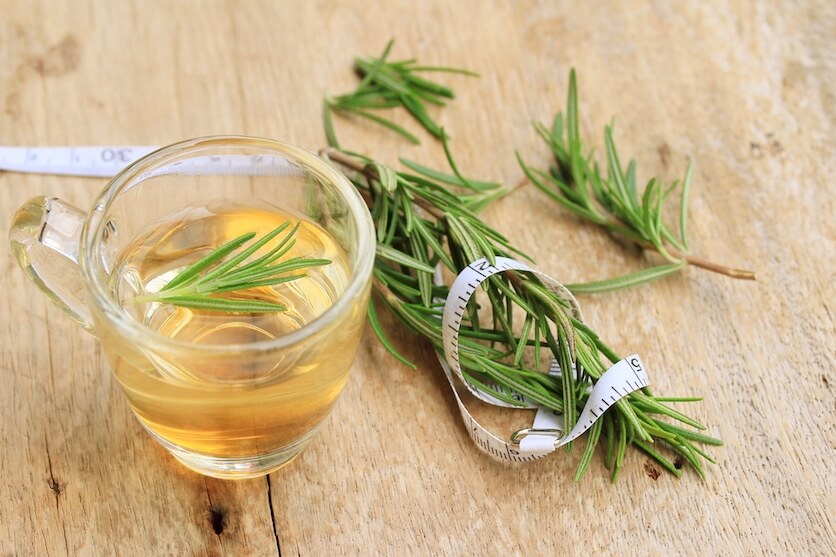
Traditional and other unconventional medicines use rosemary to treat many ailments and conditions. In a published research study (Rosmarinus officinalis L.: an update review of its phytochemistry and biological activity,) rosemary is closely scrutinized for its bioactive properties. The study states that plants belonging to the family that includes rosemary contain high levels of phenols. These phenols are said to have antibacterial, antiviral, antioxidant, and anti-inflammatory benefits.
Furthermore, rosemary’s popular use in traditional medicine helps in relieving pain, heal minor wounds, help with colic, and calm a cough. The study confirms that rosemary contains natural compounds that have pharmacological exertion towards certain conditions, injuries, and ailments. Additionally, rosemary is beneficial in treating fungal conditions.
A clinical trial mentioned in the study that patients suffering from osteoarthritis/rheumatoid arthritis pain experienced a significant reduction (40-50%) of pain after being given a rosemary essential oil tincture.
Rosemary may play a vital role in various non-conventional medicines, but perhaps the most prominent benefit this herb provides is its distinctive aroma in aromatherapy. One can’t help but grab a few sprigs of it when passing a rosemary bush and rubbing it between the hands. The intense aroma is inhaled and certainly enjoyed.
How To Make Rosemary Tea
The best way to experience rosemary tea is with fresh rosemary. The experience of preparing it begins the moment you pick it. A bottle of dried rosemary works just as fine but comes short of the fragrance of fresh.
Fresh Rosemary Tea Recipe
Ingredients
- 2 cups of water
- 1 1-2” sprig of freshly picked rosemary with the leaves removed and set aside
- Honey (to sweeten as desired)
Directions
- Bring the water to a boil.
- Remove from the heat.
- Place the rosemary leaves into a tea infuser.
- Drop the infuser into the hot water.
- Cover and allow it to steep for about 10 minutes.
- Remove the cover and the tea infuser.
- Pour the tea into a teacup.
- Add honey if desired.
- Enjoy!
Tip: Add 2 teaspoons of Genmaicha green tea to elevate rosemary tea to a super-savory drink!
Sweet Savory In A Teacup
Rosemary tea is more of a savory tea that is perfect for enjoying in the middle of the afternoon or on a chilly day. Fully take in the amazing aroma just before that first sip. Rosemary tea is definitely a must-try.
